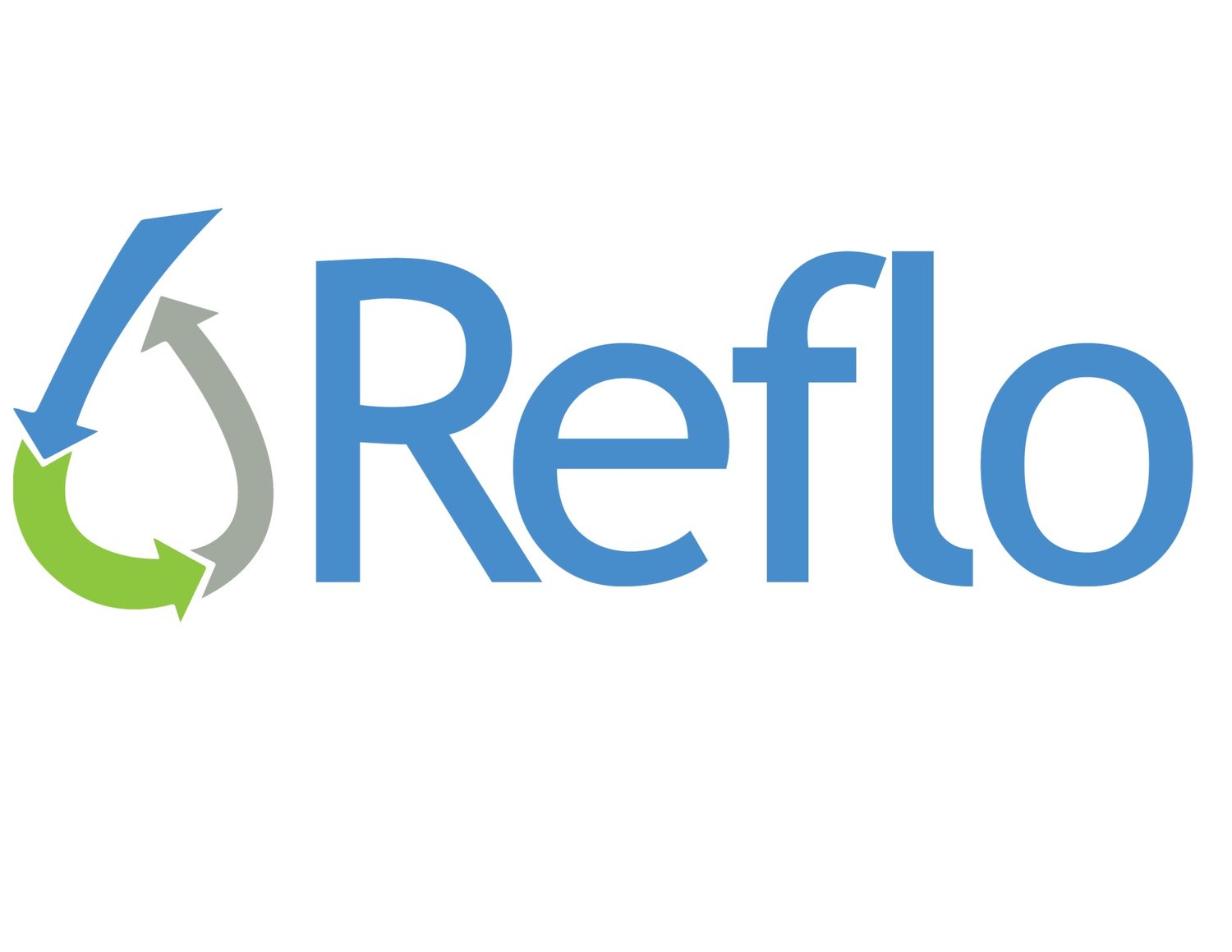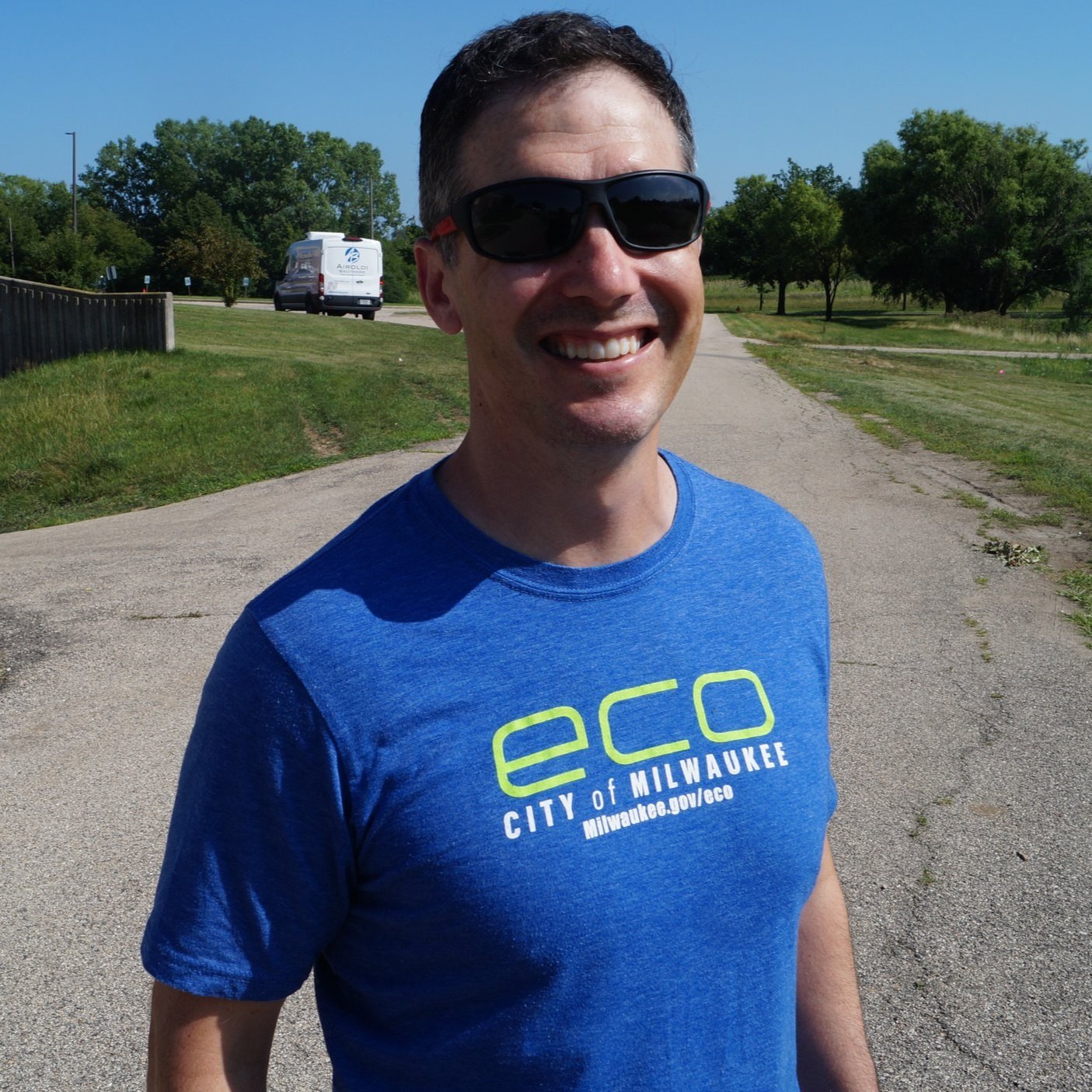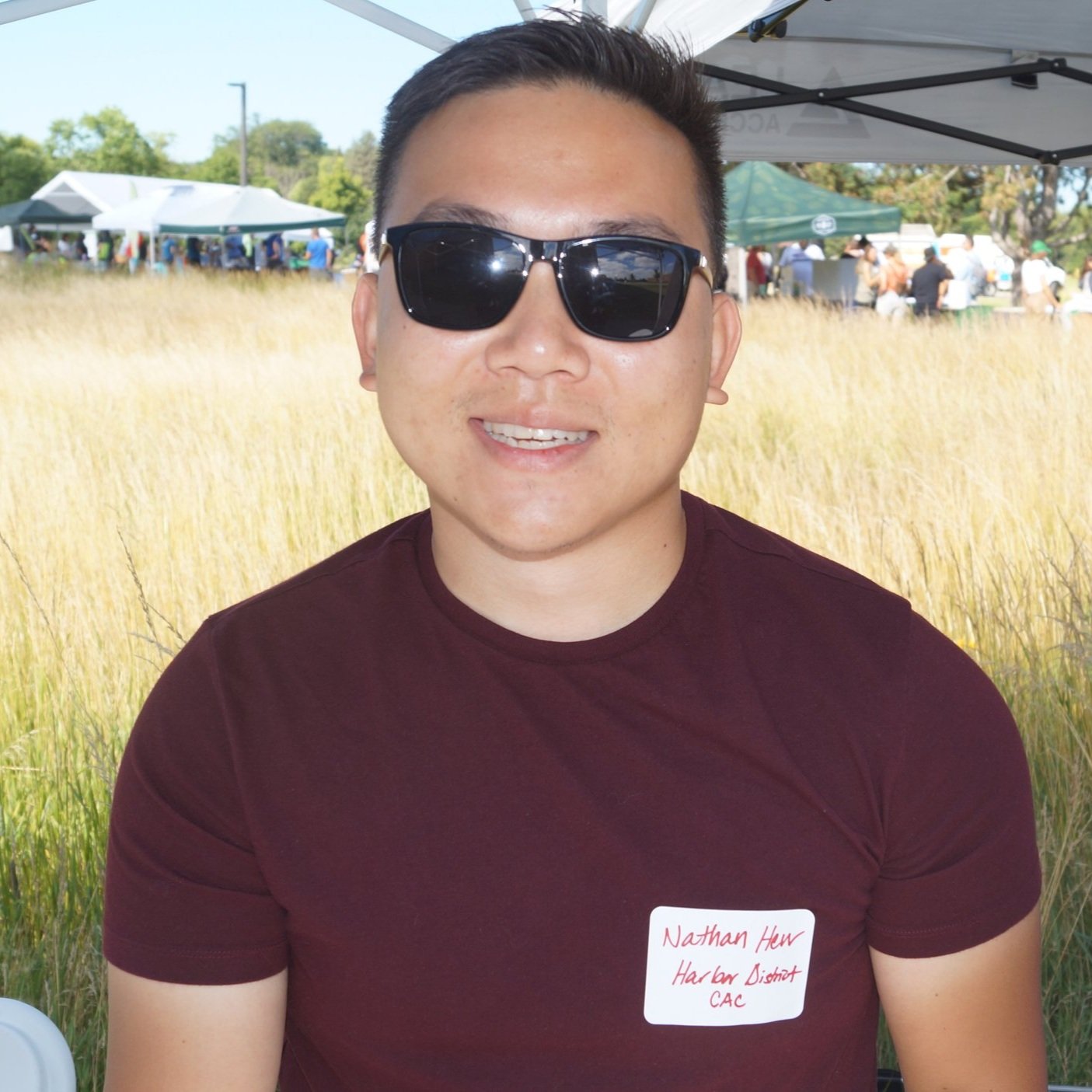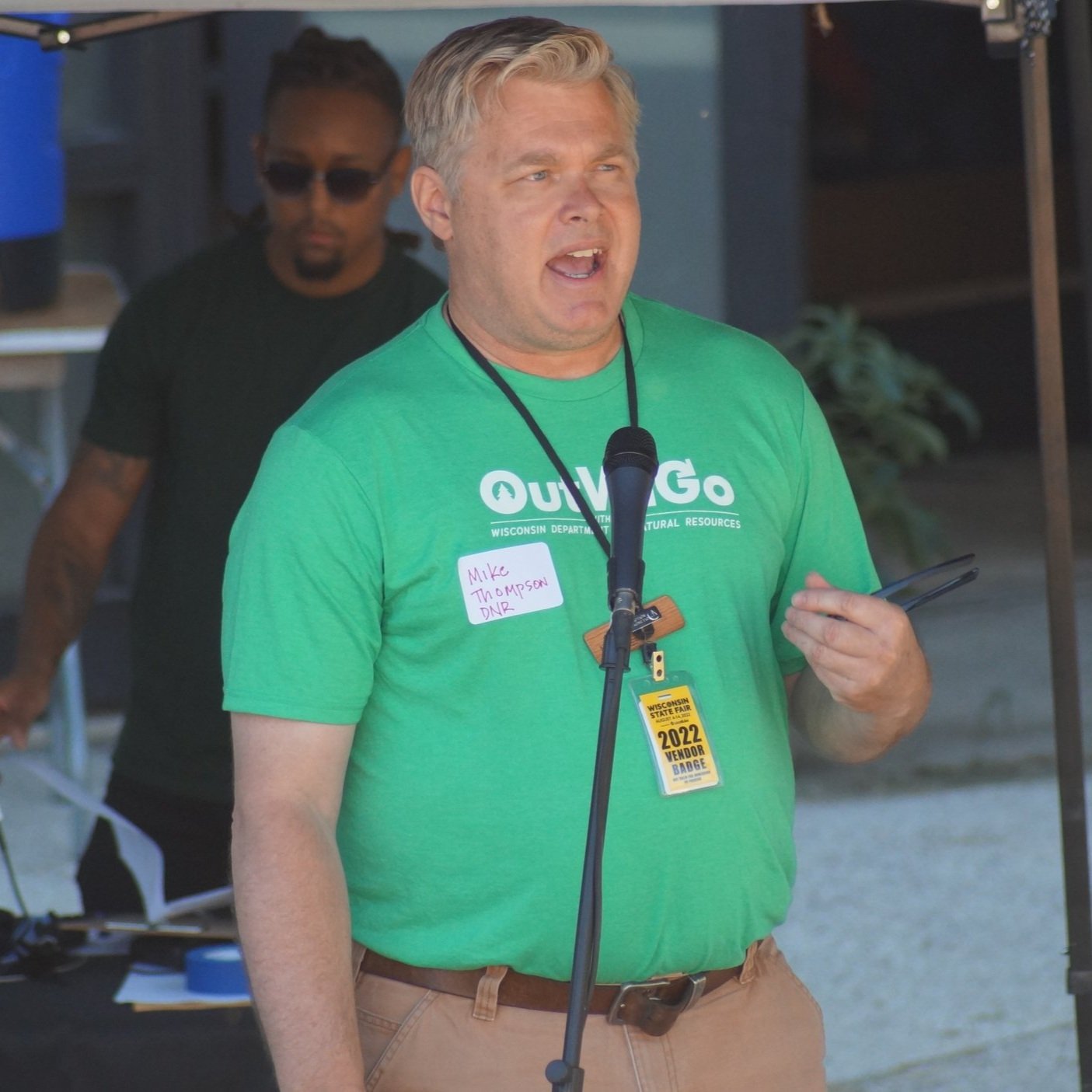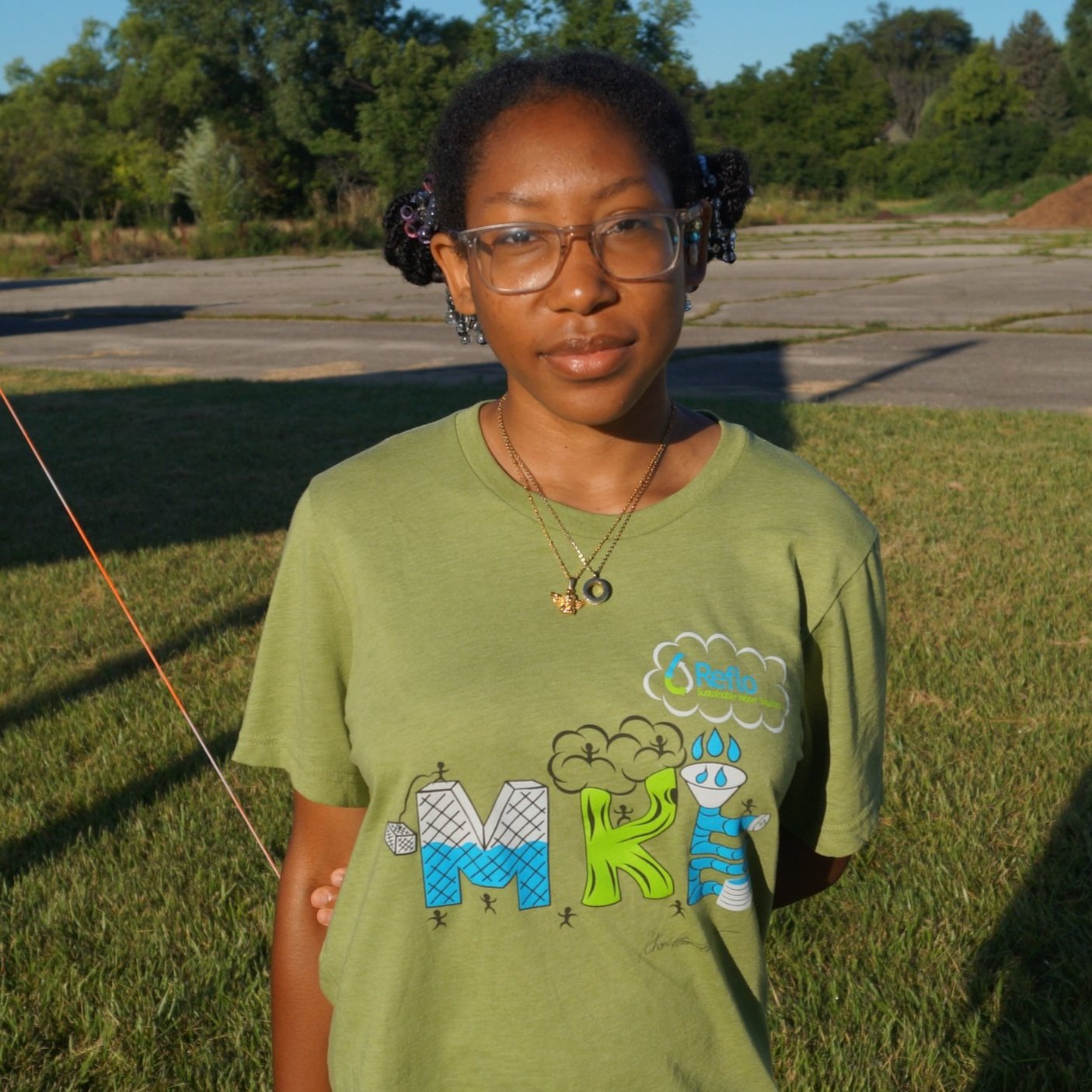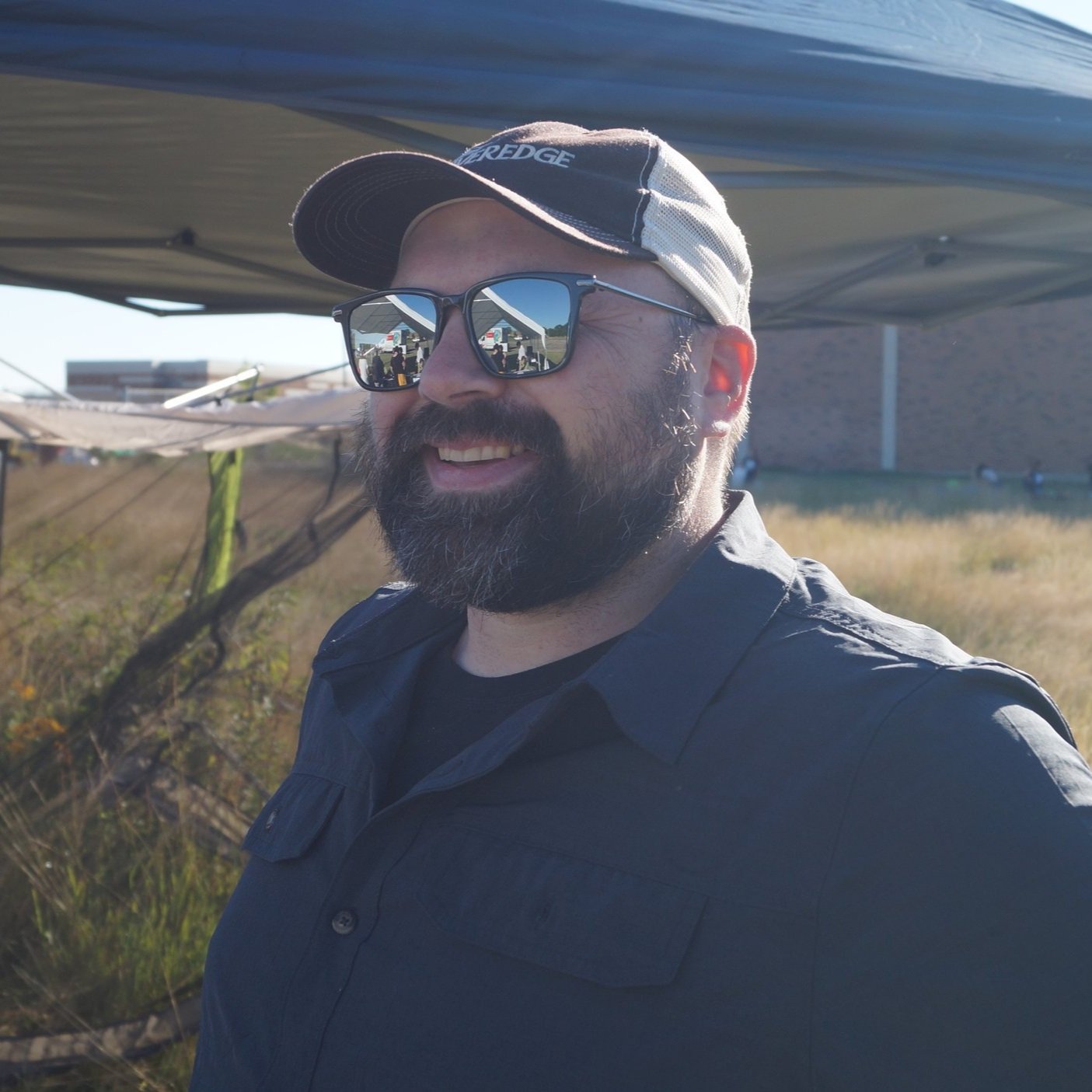Conference Conversations
Reflo’s Michael Timm roved around the Green & Healthy Schools Conference held Aug. 5, 2022 at Vincent High School to conduct short interviews with over 30 exhibitors, presenters, and attendees. This page has been edited to remove content on Feb. 22, 2023.
Did you know the MPS STEM Fair coordinator has paddleboarded almost every reach of the Milwaukee River except parts of the Kettle Moraine headwaters? What about the formative experience of a motivated Bay View Montessori teacher in the hills of the Dominican Republic during her time in the Peace Corps? Have you ever thought about what a “waste audit” could mean for your home, life, or school? What about opportunities to connect schools and students to solar energy careers and grant funding, to programming at the zoo, or water-related curriculum resources? Not to mention the stories of some of the five schools per year moving though a green schoolyard redevelopment process?
The voices below convey a variety of perspectives and some of the great energy at the sixth annual conference hosted by the Green Schools Consortium of Milwaukee and coordinated by the nonprofit Reflo. If you weren’t able to connect with all of the almost 500 people in attendance on this sunny summer day, we hope you’ll learn something from the inspirational sampling below.
Sofia Marquez
“ACE has shown us that climate justice is connected to immigrant justice, to racial justice, to gender justice, to LGBTQIA justice, and when we fight for climate justice, we’re fighting for these struggles too. The longer we wait to act, the worse all these issues become. I’ve decided not to wait.”
I graduated from Pius and I am going to Columbia College in Chicago for documentary film and I'm minoring in environmental studies. So, I really want to mix both of them and document how climate change is affecting neighborhoods or countries, cities, and just document all the stories that climate change has impacted people.
“So far, we have 31 schools that are in some stage of the [Green & Healthy Schools schoolyard redevelopment] program and we add five more each year.”
Heather Dietzel
I'm so proud of our teachers. I'm so proud of our principals being willing to take on this extra work. Our green schoolyards program is way outside of the box. They already have such full plates. ...
In between their lessons and their very full plates, they're out their weeding, they're out there learning how to revamp their lesson plans to incorporate this stuff. And it's an extra workload they wouldn't have to do, but they do it, and they're really happy about it. I love to see it.
Green & Healthy Schools MPS Schoolyard Redevelopment Projects
“To see some of the green infrastructure going into the schools or even the planning of what they were doing, it was amazing. I’ve taught in MPS for almost 18 years, and the playgrounds are usually just concrete yards as far as you can see. I know that children need to play. Children need to explore.
And for Bay View Montessori, I knew even more so, in the Montessori curriculum we incorporate so much exploration: trying to inspire children to ask questions, to learn on their own, to investigate things.
For me, it was like, we need this.”
Angela Veternick
[I]n Montessori we tell the story of the coming of life. We talk about how it started in the oceans with single cells and then evolved from there. And we were able to take magnifying glasses and find life! It was exciting to see children find even just a little bit of life in the area around us. And you probably wouldn't find that in the classroom.
Kirsten Brown
“This [the schoolyard redevelopment] is so important to us because not only is this wonderful for our general education students but it is also a way to make the space more inclusive of our special education students. We want to incorporate things like Braille and a lavender garden.”
We do have students that are immobile or nonverbal, and so to be able to interact with our students and to watch them grow and to get learn them and get to know their needs, we need more people to be able to help with our students so that we can help build the most successful life for our students as possible. So, Gaenslen is there. We're open to the community. We need your help.
Montre Moore
“We’re definitely focusing on our educational outreach and trying to ensure that we’re getting more Black and brown people in the space of urban planning, and just understanding how they can possibly play a role in the potential career opportunities that are there.”
Nikki Payne
“Kids love things like SimCity and Minecraft and all of these opportunities, but they never think about you can actually get a career out of it. You can actually build your own town or city, not just in Minecraft but actually in real life. ”
Southeastern Wisconsin Regional Planning Commission (SEWRPC)
The reason we are out here today is we have so many environmental projects that we're working on, it just makes sense to be here. We also want to work with MPS. So having the opportunity to work with so many teachers and parent coordinators, it just kinda falls right into line with what we're doing…
This is one of my favorite conferences to come to. You always learn so much. You connect with so many different organizations. It's not just MPS. But you're also connecting with all the other vendors that are here. You learn so much in ways that we can work together and help our community. —Nikki Payne
Regional Chloride Study | Regional Food System Plan | Flex Ride (regional ride-share)
“We are saying that we need the additional funding. We need more permanent, sustainable funding for the program. We feel that it needs to be ramped up—or doubled in impact from what it is right now. The program is able to take on five schools per year. We’d like to see that increase to 10 schools per year.”
Linda Frank
I'm impressed with this conference with how well attended it is, and all these great groups and you just see how much that we have in common. Where different organizations have a different focus or a different strength. Some are able to offer the research, some are focused on the water issues. It's so great to bring them all together. And really I think this coalition is a good chance to bring a lot of these organizations together on a common project. I haven't seen that yet, for really bringing people together locally on climate change.
Milwaukee City-County Task Force on Climate and Economic Equity
Erick Shambarger
“We’re just here at the Green Schools Conference, which is an outstanding opportunity to connect environmental groups to the teachers. I just want to give a shout out to the teachers who have taken on so much in the last two years with the pandemic. But also we just appreciate them so much for the ones who are passionate about it and want to get their kids involved in a greener and more prosperous future.”
First and foremost, in an urban environment, surrounded by really too much blacktop and asphalt surfaces in general, but particularly in schoolyards, that's not a healthy environment for our kids. It's not healthy from an air-quality standpoint. It doesn't give people a good sense of what the outdoors should be. And it's not equitable with suburban neighbors that may have high schools that have very large playfields and things like that, where kids are routinely getting exposed to nature.
So the green schoolyards project for us—it just checks all the boxes.
We're improving the environment directly by removing asphalt and putting in green schoolyards and we're getting kids excited about careers in education and understanding the value of nature.
“We teach social-emotional skills, so that includes things like “lightning lingo,” which is positive language, conflict-resolution skills, teamwork... We use play to teach those skills.”
“Growing up in Milwaukee, too, I felt like it has been such a great place. We’re right by one of the biggest areas of freshwater. Why can’t we do something positive to help protect and sustain it?”
“At DNR, we see flooding and resiliency as some of the front lines of climate change. And we’re very invested in that. And the bioswales and the stormwater treatment that’s happening at each kid’s school ground is a step towards recognizing that and building resiliency across the state.”
“I learned more about nature than I did before. I learned different people and different jobs. I never knew there was such thing as an engineer that works on bioswales. I never really knew bioswales existed until the internship.”
“Last year, as a Learn Deep Fellow, the middle school science teachers and myself, we worked on water—clean water. We were able to provide so many opportunities, partner up with the local community partners and take field trips and go and learn about the water in our community.”
“The idea in here is actually taking students to the greenhouses, for example, to test water, test soil, air quality even using their projects. Getting data, analyze, and share with the rest of the community. (students can create their own sensors for soil moisture, connecting engineering prototyping and coding)”
“We work as much as we can within the systems that [an organization] has. We’re not here to sell purchasing systems. The biggest challenge that we find with some school systems—not with all school systems but some school systems—where the philosophy is, you get X amount of money, and if you don’t spend it next year your budget is going to be less. That system encourages waste. It encourages schools to spend money on stuff they don’t need, stockpile it, sits in a room, gets forgotten about, whatever. But they’re just spending every dime they can in order to make sure they don’t have money cut from their budget.”
“[My Mom is] a real good inspiration, too. She really motivated me. She pushed me to do more for my city and give back. I really appreciate her.”
“Primarily we wanted to expose teachers to our climate justice curriculum and our new climate justice coach. I also wanted to get our teachers more heavily involved in planning science curriculum with us and participating in our district STEM Fair.”
“MMSD wants to invest in our community. We want to help protect Lake Michigan, and we want to get our next generation to be environmental stewards and that’s what we’re doing through schools.”
“Right now we are offering three different tracks in our internships, which focus on healthy minds, healthy bank accounts, and also food justice.”
“We are all here because of Lisa [Neeb, Green & Healthy Schools Program Manager]. We had a 50% increase in the past two weeks, which is huge. A huge thanks to Lisa for making that happen.”
“Reflo’s a fantastic partner. They’ve supported our mission, and I think we’re aligned in engaging children and green spaces. Our focus is primarily indoor, and I think that the projects that Reflo’s doing as far as the schoolyard redevelopments give kids a nice transition from indoor to outdoor and green experiences all year round.”
“I am a parent volunteer. My children went to Milwaukee German Immersion School and while I was there I noticed the kids just played on asphalt. I’m a landscape designer by trade and that made me want to do something.”
“Most of our water events and activities take place somewhere on the Milwaukee River, from Newburg all the way down to downtown.”
“We are the nonprofit wing and partner to the Milwaukee County Zoo. We provide the education programs at the zoo.”
“In a world that cries out for our help, it is our obligation to hear its cry. Organizations such as Reflo, and all those present today, are all those at the forefront of this call. ”
“My goal is so they fall in love with the waters of Milwaukee. We are so lucky to live here, especially now in this era of drought. I fear that people with big straws from the West are going to be coming to our doorstop and wanting our waters. We have to protect it. I’m happy more than ever to share this message with students and teachers.”
“It is truly a playground revolution. If you think of all the plastic and steel you typically see, that’s not what we’re doing. We’re much more of a ropes-course-type layout. We’re using black locust primarily as our building material, and we incorporate rocks and other netform to really transform the way play spaces are used.”
“I didn’t find my love for the environment until I got to college. I really look back on it and it was in my face the whole time but I never had someone to point me in that direction. I find it very rewarding. It just brings me joy to do that with kids. Give them a perspective they wouldn’t otherwise have if someone else wasn’t throwing that in their face, and then letting them put the pieces together themselves.”
“This [conference] is a place where you have a range of community partners from higher ed, industry, nonprofits who want to do interesting things with schools and you’ve got a whole bunch of teachers walking around who want to do interesting things with them. We need more of these connection opportunities. Exciting stuff.”
“Reset. Restart. Refocus. As many times as you need. Just don’t quit. ”
“Yay! I get to do something local!”
“We wanted to participate [in the conference] because it’s a great opportunity to share all the initiatives that we’re involved in with renewable energy and energy education and solar-on-school installations. [...] There’s so many opportunities. In terms of my background in education and helping young people find their way in a career path, this is where it’s at. The things they’re doing in the future right now with renewable energy is just incredible. And to have that door open as a pathway for young people looking for what to do with their lives is just essential.”
“We have 2,700 trees planted in our forest. We have an orchard, arboretum, and we also have bioswales and a cistern to help further our efforts in becoming a better, greener, healthier school.”
Henry Argeropoulos
“Wow. I’m just amazed by how much we’ve grown. We started this program about eight years ago. It started off really slow, but in the last five years it has really exploded. ”
Ms. Tina Gleason
Last year we were recognized with the highest honor in Wisconsin: the Sugar Maple School status for a Green & Healthy School. Then we were nominated for the Green Ribbon Schools, the U.S. Department of Education Green Ribbon School, and we won that this year.
The more teachers learn about [our green & healthy schoolyard], the more excited they get. Especially the high school teachers. Because I think they think the playground's for the little kids. And I'm like, no, it's an outdoor classroom. It's not a playground. You can take your kids out there and you can do stuff with them, and I think that's really exciting….
It was also a good reason to get them outside because of covid. Get them outside, take off their masks.
Golda Meir School Green Schoolyard Redevelopment Web Page | DPI Recognition for Golda Meir Green Ribbon Award (a nationwide honor)
Chris Giddens
“I am a graduate intern with Milwaukee Riverkeeper and Wisconsin Sea Grant. I’ve been working this summer to develop a plastic waste audit that can be employed in Milwaukee’s public schools and then also some adjacent marine debris and plastic education that’s specifically catered to the Great Lakes ecosystem.”
“We try to employ as many residents as possible from the Lindsay Heights neighborhood. Really anybody that has any employment barriers. We do a lot of work with the City, as far as maintaining the bioswales. We’ve helped install several of the Strong Neighborhood pocket parks. We maintain those. ”
Laura Pehmoeller
& Kimberly Eubanks
“We have a growing youth leadership program where we work with teens for leadership in environmental studies and gardening. ”
“We’ve done a lot of invasive species removals along the river this summer. Learning new stuff about the species, the native and invasive species, so we can spot them and which ones are good to keep and which ones are harming and how exactly they are harming the specific prairie we are in.”
“My end goal is to be an environmental attorney. Ideally, I wanted to be an appeal attorney for the Environmental [& Natural] Resources Division at the Department of Justice.”
Milan Jones & Sanaa Thomas
Milan & Sanaa are high school seniors interning with River Revitalization Foundation. Milan is a senior at Rufus King High School who plans to pursue environmental law. Sanaa is a senior at Milwaukee School of the Arts who plans to go to film school and merge her passions for filmmaking and environment.
